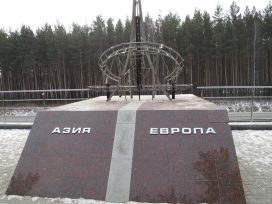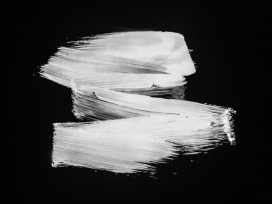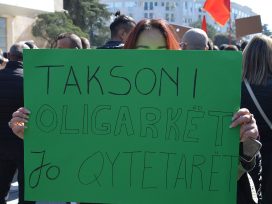Cracks in the Kremlin matrix
Peter Pomerantsev enters the matrix of managed democracy that underpins postmodern dictatorship in Russia. A society of pure spectacle, with fake parties, fake opposition, fake scandals and fake action: this is the political technologists’ project, in which (almost) everything becomes PR.
Sometime near the start of this century, at the height of the Russian oil boom, the blossoming of the Putin era, the maturing of “managed democracy” and the birth of postmodern dictatorship, I found myself in a long, grey room on the top floor of Ostankino, the Russian television centre that is the size of five football fields and the battering ram of Kremlin propaganda. I had recently arrived from London to make it as a policy consultant and later TV producer in the rapidly expanding Russian television market. This was the weekly brainstorm at Channel 1, where Moscow’s most dynamic minds would gather to create TV masterpieces of managed democracy, the show business facade of a free society while the reality was becoming more authoritarian by the hour. There were more than twenty of us in the room: tanned broadcasters in white silk shirts and politics professors with sweaty beards and heavy breath and ad execs in trainers. There were no women. Everyone was smoking. There was so much smoke it made the skin itch. I had been admitted by accident, smuggled in by a friendly publisher: due to my Russian surname no one had noticed I was British, and I kept my mouth shut so no one would notice my accent.
At the end of the table sat Mikhail Leontiev, the country’s most famous political TV presenter. He was small and spoke fast, with a smoky voice: “We all know there will be no real politics, everyone knows there’s no real elections any more, but we still have to give our viewers the sense something is happening. They need to be kept entertained!”
Leontiev is best known for the five minutes of hate he delivers after the news. In his TV show he plucks a theme (oligarchs, America, football, Afghanistan) and he rants for five minutes hinting, nudging, winking, insinuating though rarely ever saying anything directly, repeating words like “them” and “the enemy” endlessly until they are imprinted on the mind. In the 1990s he had been a liberal democrat but now that the wind has changed he is a nationalist autocrat. “So what should we play with? Shall we attack oligarchs?” continued Leontiev. “Who’s the enemy this week? Politics has got to feel like… like a movie!”
The new Kremlin was determined not to make the same mistake as the old Soviet Union. They would never let TV or politics become dull. They were putting the ratings into authoritarianism, the dynamics into dictatorship, creating a society of pure spectacle with fake parties and fake opposition and fake scandals and fake action. Sitting in that smoky room I had the sense that reality was somehow malleable, that I was with Prosperos who could project any existence they wanted onto the desert of the real that was post-Soviet Russia. And in a country so vast, living in seven time zones and almost as many zones of history, TV is the force that can unify and rule and bind it together.
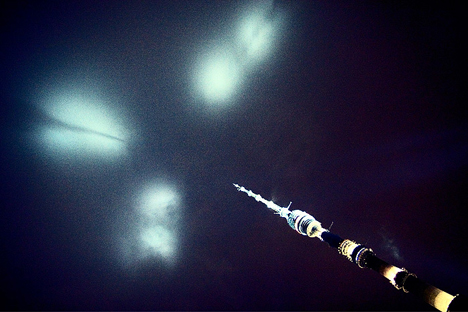
Ostankino, Moscow. Photo: Aleksey Dorofeev. Source: Flickr
Over the next decade the channels broadcasting from Ostankino would perfect the skill of combining propaganda and show-business. Putin’s image was at the centre of the show: he was to be a man for all seasons, the action man hunting tigers bare-chested, the cool guy riding Harleys, the housewives’ friend berating supermarkets for their high prices. In a favourite TV scene Putin sits facing his ministers, and they all sweat and writhe with fear and embarrassment as Putin blames them for letting him and the country down. TV helped Putin rise above mere politics, above blame and responsibility: a postmodern TV tsar. But Channel 1 would never allow itself to show mere Putin PR. Right after the news it showed edgy realist dramas about the lives of teens in a drug-infested school: buying trust one moment and then exploiting it for political gain. Another Ostankino channel, NTV, once considered the most liberal channel in Russia, showed a non-stop flood of real-life horror stories: murders, rapes, robberies – the exact opposite of the “classical” totalitarian approach to TV where you show a perfect, fake reality. In a much more sophisticated Russia, the state shows gruesome reality to make the viewer feel scared and desperate for the Kremlin’s rule and more state control.
The producers and journalists who made these shows were all liberals in their private lives, would holiday in Tuscany and were completely European in their tastes. When I would ask how they could marry their professional and personal lives they would look at me like I were a fool and answer: “Over the last twenty years we’ve lived through a communism we never believed in, democracy and defaults and mafia state and oligarchy, and we’ve realized they are illusions, that everything is PR”. “Everything is PR” became the favourite phrase of the new Russia, my Moscow peers were filled with a sense they were both cynical and enlightened, somehow “beyond belief”. When I would ask them about Soviet-era dissidents who had fought against communism they dismissed them as naive dreamers, and my own western attachments to such vague notions as “human rights” and “freedom” as a blunder: “Can’t you see your own governments are just as bad as ours”, they would tell me. To believe in something and stand by it in this world was derided, the ability to be a shape-shifter was celebrated: “I can work with any power I’m told to”, said the head of NTV, who had earlier worked for the pro-democracy, US Congress-funded Radio Free Europe. He meant it as a compliment to himself. Vladimir Nabokov once described a species of butterfly which at an early stage in its development had to learn how to change colours to hide from predators. The butterfly’s predators had long died off, but still it changed its colours from the sheer pleasure of transformation. Something similar has happened to the Russian elites: during the Soviet period they learnt to dissimulate in order to survive. Now there is no need to constantly change your colours but they continue to do so out of a sort of dark joy – conformism raised to the level of aesthetic act.
This attitude of triumphant cynicism and endless shape-shifting was reflected in one of the key novels of the era, Almost Zero. A grotesque satire, Almost Zero tells the story of Egor, who grows up as a bookish hipster in a provincial Soviet town disenchanted with late communism’s sham ideology. In the 1980s he moves to Moscow to hang out on the fringes of the bohemian set; in the 1990s he becomes a PR guru happy to serve anyone who pays the rent. In the world of Almost Zero everyone is for sale: even the most outspoken liberal journalists have their price. It is a dangerous world where rival gangs shoot each other on the streets for publishing rights to Russian classics, where gentle intellectuals turn out to be mafia dons, and where the secret services infiltrate everywhere for their own murky ends. Egor is the master manipulator, some sort of post-Soviet superman: “Egor could clearly see the heights of Creation, where in a blinding abyss frolic non-corporeal, un-piloted, pathless words, free beings, joining and dividing and merging to create beautiful patterns.”
The book becomes even more interesting when one takes into account who wrote it. Vladislav Surkov was deputy head of the Presidential Administration and, as such, the informal ideologue of the Putin era, the architect of managed democracy. He was personally responsible for running the political and media order of the country, known as the “puppet-master who privatized the Russian political system”. Like his hero in Almost Zero Surkov had been a bohemian, training as a theatre director, before becoming a PR man and moving into politics. Watching Surkov speak is like watching a great impersonator morphing between different roles: a woolly liberal preaching modernization and innovation one moment, a finger-wagging nationalist demagogue the next, extolling the Russian soul while espousing his admiration for Tupac Shakur and Joan Miró. If the west defeated the USSR by uniting free market economics, cool culture and democratic politics into one package (parliaments, investment banks and abstract expressionism fused to defeat the politburo, planned economics and social realism), then Surkov’s genius has been to tear those associations apart: to marry authoritarianism and modern art, to use the language of rights and representation to validate tyranny, to re-cut and paste democratic capitalism into a pastiche until it means the reverse of its original purpose.
From his desk in the Kremlin, Surkov oversaw the whole charade of Russia’s virtual politics, with phones on his desk connecting directly to the quasi-opposition parties. He was the ultimate “political technologist” – a uniquely post-Soviet profession – who acts as vizier or Wizard of Oz to the system and is able to magic up puppet political parties and social movements in a great simulacrum of reality. Indeed, when historians look back at Russian history from the mid-1990s to the present they might well define it as the age of the “political technologists” rather than the “Yeltsin” or “Putin” eras. In many ways the first of the great viziers was Boris Berezovsky in the 1990s, who rustled up the ruling party Edinstvo (later United Russia) as what he called an “empty shell” and used his control of television to transform Vladimir Putin from grey apparatchik to macho hero. But while previous “viziers” had to survive in a competitive environment, Surkov’s control of the set of Russian society was absolute. He would clap once and create a Civic Forum for NGOs; clap again and fund nationalist movements that would accuse the NGOs of being tools of the West. He would wave his wand and a neo-fascist youth movement would appear burning books by modernist writers for being unpatriotic; then with a flourish he would sponsor a lavish arts festival for the most provocative modern artists in Moscow. And then support Orthodox fundamentalists, dressed in all-black and carrying crosses who would in turn attack the modern art exhibitions. The idea was to own all forms of political discourse, to not let any independent movements develop outside of the Kremlin.
Working in this world was a disorientating experience. During my years in Moscow I stayed away from the more obvious propaganda of the Ostankino channels (as a British producer I wasn’t that welcome there), and gravitated towards the seemingly “opposition” projects. One of the best-known was SNOB, which combined Internet, TV and magazines to help foster a new class of “global Russians”: western-leaning liberals and wealthy urbanites. SNOB was funded to a tune of 20 million dollars by Russia’s richest man, Mikhail Prokhorov. The offices of SNOB were in a converted factory near the centre of Moscow. The office was hipper than anything I’d ever come across in Shoreditch or Prenzlauer Berg: the open brick-work of the old factory was left untouched, the huge arches of the giant windows preserved, with edit suites and open plan offices built delicately in. The employees were bright young things, the children of Soviet intelligentsia, with perfect English and vocal in their criticism of the regime. The deputy editor was Masha Gessen, a well-known American-Russian activist for LGBT rights, and her articles in glossy western magazines attacked Putin vociferously. But for all the oppositional posturing of SNOB, it was clear there was no way that a project with such a high-profile could have been created without Surkov’s blessing. This was just the sort of managed opposition the Kremlin was very comfortable with: on the one hand it allowed liberals to feel they had a free voice and a home (and a pay-check), on the other it only helped the Kremlin to define the “opposition” as hipster Muscovites, out of touch with “ordinary” Russians, obsessed with “marginal” issues such as gay rights (in a largely homophobic country). The very name of the project, SNOB, though meant ironically, already defined us as a potential object of hate. And for all the anti-Putin rants on SNOB we would never actually do any real investigative journalism, find out any hard facts about corruption and money stolen from the state budget: in twenty-first-century Russia you are allowed to say anything you want as long as you don’t follow the corruption trail. After work I would sit with my colleagues, drinking and talking: were we the opposition? Were we helping Russia become a freer place? Or were we actually a Kremlin project strengthening Putin? Actually doing damage to the cause of liberty? A pressure valve to get rid of frustration but never incriminating anyone? Or were we both? A card to be played? As the 2012 presidential elections approached Prokhorov became the Kremlin-endorsed liberal candidate: the SNOB project had helped endear him to the intelligentsia, while as a flamboyant oligarch famous for his debauched parties in Courchevel he was an easy target for the Kremlin and helped Putin’s claim to be fighting the oligarchs. Again Moscow’s chattering classes speculated: was Prokhorov a genuine candidate? Was it better to vote for him or did that mean you’re playing the Kremlin game? Or should one vote for no one and ignore the system? In the end Prokhorov gained a fairly impressive 13 per cent – before elegantly retreating from the political scene.
The brilliance of the system of managed democracy/postmodern dictatorship was that instead of simply oppressing the opposition, as had been the case in the twentieth century, it entered into all ideologies and movements, exploiting and rendering them absurd from the inside. It was no accident that one of the most popular films in Russia in the noughties was The Matrix series, the science fiction film starring Keanu Reaves that portrays the contemporary world as a virtual illusion created by machines who feed off the unknowing humans, who are distracted by a simulated reality. In Moscow crowds queued around the block to see the movies, writers and politicians quoted them as a great metaphor for contemporary Russia. But as the decade wore on, and as I continued to make TV shows for Russian channels, I found there were severe cracks in the Kremlin’s matrix.
The network I was working for towards the end of the noughties was TNT, an entertainment channel aimed at the country’s youth. TNT was deeply apolitical, it made sit-coms and glossy, somewhat salacious reality shows. But it also had a small documentary department whose job it was to keep a pulse on what the young people really thought and felt: TNT’s business was ratings and it couldn’t ignore its audiences concerns. One of the most disturbing statistics to emerge was the rapid rise in suicide rates among young people, especially teenage girls. As I made a film about two young female friends who had committed suicide I discovered a generation which on the one hand faced none of the material difficulties their parents contended with in the early 1990s, but on the other had no ideals or ideologies to guide them through their difficult teenage years: the flip-side of triumphant cynicism was despair. As I continued my series of films about Russian teenagers, I found a generation utterly alienated from the system. For many boys the greatest problem in their lives was their mandatory years of army service, where they faced physical abuse and were forced into black-market jobs for a corrupt class of army officers. Battles between teens and cops were regular. I followed the story of a bunch of teens who were beaten black and blue by police for the dubious sin of drinking beer in a public place. Outside the matrix of managed democracy new heroes were emerging: in Ekaterinburg a young man who had his bones broken by traffic police now secretly filmed traffic cops taking bribes and posted them online to massive public support. The people I filmed didn’t translate their anger and hopelessness into any ideologies, they didn’t necessarily think of themselves as political – all political language has been taken over by the state. When they did go out to protest they didn’t use the language of “rights” and “democracy”, but absurdist placards with lines like “wash your hands”, “the best friend of the body is the leg”, “who’s the boss?”. Absurdity seemed the best response to the arch satire of managed democracy.
The films I and other documentary directors made at TNT rated well: there was a hunger among the young generation to watch programs which portrayed their own world. Such films would have been impossible on the Ostankino channels, but as we were a “youth” channel we managed to get away with it. The truth was that the head of the channel, a businessman rather than a creative, barely noticed what was going on in the distant documentary department: all he looked at were the ratings figures and they were fine. But one day the head of the channel was asked for an interview by one of the country’s top broadsheets. He felt flattered – it was rare for a serious newspaper to take an interest in a slightly trashy entertainment channel. But to the horror of the channel head the journalist from the newspaper asked him whether he was planning to turn the channel into a political tool. Why was his documentary strand showing such risqué stories? Was this approved by the state? After this I was politely told that TNT would not be making any more “social” films: but would I be interested in making something about footballers’ wives?
In 2011 and 2012 the smaller frustrations I had been observing across the country spilled en masse onto the streets as hundreds of thousands of Russians demonstrated against Putin’s orchestrated return to the Presidency. “Enough Surkovian propaganda,” the crowds cried: this was a rejection not so much of any political direction, left or right, chosen by the Kremlin, but of the system of virtual politics which had ruled Russia since the mid-1990s, an attempt to find a new earnestness and replace triumphant cynicism with values. This conflict between a simulated politics and the desire for a more meaningful one is at the centre of the current political tension in Russia. The great challenge for the new Russian opposition has been to try and find a language to express itself in when terms like “democracy” and “modernization” have become toxic. This search is taking various forms. The loudest voice in the opposition is the anti-corruption blogger turned budding politician Alexey Navalny, who was the star of the protests and is now being sued by the Kremlin in a farcical corruption case. Navalny avoids “big” ideology. Instead he focuses on hard corruption facts – which bureaucrat stole what and how much. He has a playground sense of righteous anger: he famously called Putin’s United Russia “the party of thieves and meanies”. His catchphrase, “one for all and all for one”, is a quote from the universally loved children’s movie Three Musketeers, tugging at memories of a “justice” narrative Russian kids grew up with before they became such triumphant cynics. But while Navalany’s associations reach back into childhood, his delivery is streetwise with a violent tinge – he is an unashamed nationalist and calls for a “Russia for Russians”. In the protests very real nationalists marched together with real liberals, both desiring a “real” politics: the battle against simulated politics is itself full of dangers.
Another narrative used by the opposition centres around urban design and architecture. During the course of the Putin era, Moscow has become increasingly clogged up, with neo-Stalinist mega buildings taking over every green space and courtyard of the city, built with corrupt contracts enriching government insiders. Strelka, an architecture and design school, became a hot-bed of the opposition as it helped develop ideas about re-organizing the city, publishing a manifesto about the need for “civic space” – a new term in Russia. This was a case of using the language of urban planning to talk about politics and “give us back our city” became one of the clarion calls of the protests. The language of environmentalism has also taken on a political dimension. One of the opposition leaders is Evgeniya Chirikova, who began her campaign as an eco-warrior trying to save the woods by her home from a corrupt road deal. The desire to keep the environment “pure” became a synonym for the need to “clean up” government corruption.
As it searches for a moral code in which to couch itself, the opposition has taken to invoking the dissidents of the 1970s: after being the butt of jokes throughout the noughties they are suddenly heroes. At their trial, the anti-Putin punk band Pussy Riot compared their trial to the show trials of dissidents like Sinyavsky in the 1960s, referenced Joseph Brodsky in their closing statements and peppered their discourse with 1970s terms like “dostojnstvo” (dignity), and ‘sovest” (conscience). Parts of the new opposition are also avid readers of French situationists, recently translated into Russian. As I wandered about the protests near Occupy Abaj last summer I could hear earnest young students talking about Debord’s The Society of the Spectacle deep in to the night, a language ideally suited to criticize the virtual reality of managed democracy.
Though the protest movement has achieved less than nothing politically it has completely changed the contours of the debate in Russia and has broken the Kremlin’s monopoly on discourse. The first to shoulder the blame for the matrix’s breakdown were its authors, the political technologist-viziers. Surkov himself was demoted and then fired in May 2013. In a humiliating, televized scene Surkov sat in front of Putin as the president told him off for failing to deliver results. Surkov squealed, verbally prostrated himself: “of course you are quite right in all your evaluations and I would never dare to question them,” he said. Putin looked at him with disdain. There was a deep irony in the scene: Surkov and the political technologists had created this genre of ritual televized humiliations where Putin played tsar and his ministers whipping boys, indeed they had created the Putin we know. The puppet master was being put on trial by his own puppets, hauled into his own scenery where he was humiliated by his own creations. Observing the Kremlin’s behaviour in Putin’s third term, one has the sense that the directors have left the building and the puppets have taken over in a hyperactive frenzy. To counteract Navalny’s attempt to become a hero to nationalists, the Kremlin has been trying to whip up a twenty-first century rehash of the tsarist formula of autocracy-orthodoxy-nationalism: the religious fanatics carefully cultivated by Surkov to play a side-role in the puppet show of managed democracy now patrol the streets of Moscow, vigilantes defending the city from “satanic enemies in the pay of the West”; the skinheads secretly funded from the Kremlin are now crawling from out of their cellars to work in government.
Meanwhile, the Ostankino channels are pushing propaganda to the point of almost Brechtian exaggeration. The other day, I saw a programme with Leontiev on NTV. He looked haggard and bloodshot, ranting without any shred of evidence but with wild-eyed belief about how Britain’s MI6 were responsible for the deaths of anti-Putin defectors in London: “They are trying to set us up” said Leontiev, to a background soundtrack straight out of a B-movie horror flick. Worried that Navalny’s campaign against corruption would win him fans, the Ostankino channels now show fly-on-the-wall busts of ministers and parliamentarians. The search for enemies on the inside, witch-hunts for secret cells has begun. A paranoid Duma, for so long choreographed with such care to create the illusion of debate, has plunged into a caricature cabaret of feudal obsequiousness, typing up patriotic laws faster than the printer can print them, each MP desperate not to be the next one busted on TV, denouncing fellow Duma deputies who sided with the opposition as traitors, seeing CIA plots under every bed. The definitive law of the new age is the ban on American families adopting Russian orphans: a response to Washington’s decision to publicly name corrupt Russian bureaucrats banned from entering or investing in the United States. The orphans law wasn’t cooked up by sophisticated political technologists, it was pushed through by Putin himself, consciously opting to use children as a political weapon. “You think we’re mad,” the monstrous, armed, rich puppets seem to be saying, “we’ll show you mad. You think we’re bad? We’ll show you bad…”
Putin is no longer trying to be the tsar who sits above politics, the president of “stability” and “efficiency”. He is now touted as the president of the majority (the regime’s favourite new word), the champion of the “labour aristocracy”. In a televized exchange with the nation, Putin talked to military factory workers from the provincial town of Tagil. Standing in overalls in front of a tank, the workers promised Putin that if protests against him continued they would “come to Moscow and defend our stability”. But when journalists travelled to Tagil they found the workers didn’t actually exist, the whole thing had been a piece of play-acting organized by PR men and managers – who had dressed up as factory workers. The end of the political technologists, of the viziers, doesn’t mean Russian politics is about to become real, rather it is spinning away into hallucination cubed, a nightmare dimension where there is no reference point back to reality, where puppets talk to holograms and both are convinced they are real.
In this new era the rules of the game have changed. During the era of shape-shifting one could be both a liberal and work for the Kremlin: everything was play and nothing was taken seriously. Now you have to make a decision: either you back the use of orphans as a political weapon or you don’t; either you support the imprisonment of Pussy Riot or you don’t. “There is a point where cooperation becomes collaboration,” the author Boris Akunin said recently, speaking specifically to Moscow’s chattering classes, to the TV producers and magazine editors. Like everyone else I had to make a decision. Sometime in 2010 I was invited by the Ostankino channels to make my dream project: a big budget historical docu-drama. It was a real Faustian bargain: my greatest desire for the small price of starting to work for Ostankino. The meeting, as such things must be, took place after midnight. I walked down the long corridors I had last visited all those years ago as I sat in on the Channel 1 think-tank. The head producer offering me the job was a thin, pale man with a lovely wide smile. He had made his name and his millions as Russia’s first TV psychologist: Dr Kurpatov. All round the room were books with his advice on how to help with everything from marriage problems through to fear of death. Now he had become deputy head of Channel 1 on the premise that he could keep the whole nation calm and pacified: “The crisis has the Kremlin worried,” one of Kurpatov’s assistants told me, “we need to keep the nation distracted. Any ideas?” Dr Kurpatov was a hypnotherapist and nodded kindly as we talked, agreeing with everything I said and laughing at all my jokes. It felt good talking to him. He seemed to understand my worries. Only once did his facade drop: when in a moment of absent-mindedness I forgot his name and his eyes flashed with a fierce anger. It was a relief to know who I was really dealing with. In the end I said no to Ostankino – but then again I always had a life in London to fall back on. For my colleagues in Moscow the choice is far more tortuous.
As fate would have it, one of the first TV projects I was commissioned on returning home was a documentary series about rich Russians in London. While I had been away new Russian money had flooded the city. Everywhere I went in the poshest London neighbourhoods I heard Russian and saw many of the faces I knew from Moscow. “We’ll soon own this town,” said a Russian banker who lives in London in a programme broadcast by the BBC this year, and who is accused of complicity in the murder of an anti-corruption lawyer in Moscow. “We might leave the British their parliament but we’ll own the rest.” When activists tried to push through a visa and investment ban on corrupt Russian officials from entering the country, the British government rejected it, worried it might scare away Russian cash. A whole industry of lawyers, estate agents, banks, PR men, private schools and butlers exists to service the new money – and no one wants to ask where it comes from. When a Russian newspaper tried to get British politicians of both parties to protest against the arrest and trial of Alexey Navalny they refused to give comment, not wanting to enrage Putin. As I make my TV series I increasingly hear from the British elite the same arch cynicism I heard from my Russian colleagues: “Why should we stand up for anything? Our governments are just as bad as the Russian. We don’t have the right to do anything. It’s all just a game anyway. All that stuff about human rights and ideals – it’s all just PR you know.”
Published 14 June 2013
Original in English
First published by Eurozine
Contributed by Transit © Peter Pomerantsev / Eurozine
PDF/PRINTPublished in
In collaboration with
In focal points
- The global politics of protest
- Dynamics of inequality
- Between hegemony and distrust
- After democratic transition
- The unpredictability of politics in the age of social media
- Two-and-a-half theories
- Living in the matrix
- When the feet become the head
- The future council
- Is China more democratic than Russia?
Newsletter
Subscribe to know what’s worth thinking about.
Related Articles
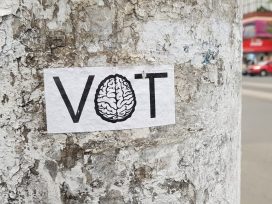
Romania’s anti-vax movement has mutated into a pro-Russian protest bloc. Representing a politically disenchanted online public, the far-right Alliance for the Union of Romanians is increasingly influencing the mainstream agenda.
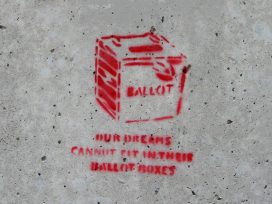
Although it makes for a great dramatic effect, the theories of the sudden death of democracy disregard the gradual erosion and capture of institutions, and the role of the populace – argues political scientist John Keane.

